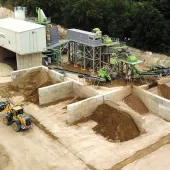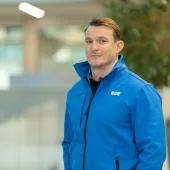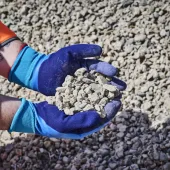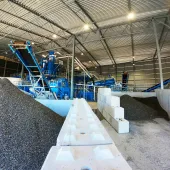Sustainability success at David Ross Sports Village

Wastecycle’s attention to the environment helps Kier and the University of Nottingham achieve ‘top honours’
The £31.5 million David Ross Sports Village at the University of Nottingham is an impressive development and so is the fact that 97% of construction waste was diverted from landfill during its construction. Part of a wider £40 million development, the new sports complex is named after Nottingham alumnus and Carphone Warehouse founder David Ross, who donated a significant sum to the construction project.
The complex features an array of facilities, ranging from what is believed to be largest university sports hall in the UK to a state-of-the-art strength and conditioning suite, and a 60m indoor running track.
On the project, lead contractors Kier faced several challenges, not least ensuring the waste produced during the building was collected and recycled/ reused in the most effective manner. Thanks to a partnership with Wastecycle, practically all of the waste was recovered and diverted from landfill.
The East Midlands-based recycling company collected more than 750 tonnes of waste during the 18-month build, following a carefully devised collection schedule which dovetailed with Kier’s programme of works. As well as supplying 1,100-litre bins for trade waste and mixed recycling from site offices, Wastecycle also provided eight-yard skips for wood, medial and construction waste and Roll-on Roll-off skips for further building waste.
In total, Wastecycle synchronized more than 200 container exchanges with the demanding construction schedule and the university academic timetable to ensure student life was not severely affected.
‘The David Ross Sports Village is perhaps the perfect example of how we work in partnership with our customers,’ said Paul Clements, commercial director for Wastecycle. ‘We developed a waste-collection plan that dovetailed perfectly with Kier’s and the University of Nottingham’s needs. So, as well as providing additional machinery and training Kier’s team on how to use it, we also delivered night-time services to minimize the vehicle disruption on campus and even collected canteen waste separately to construction waste.’
Paul Williamson, site manager at Kier, commented: ‘Working with Wastecycle on this project certainly helped us meet environmental targets and meant the storage of waste on site and its collection ran like clockwork. It was a fantastic partnership and we’re delighted that the amount of waste we collected and diverted – around 97% – was as impressive as the facility we built for the University of Nottingham.’









